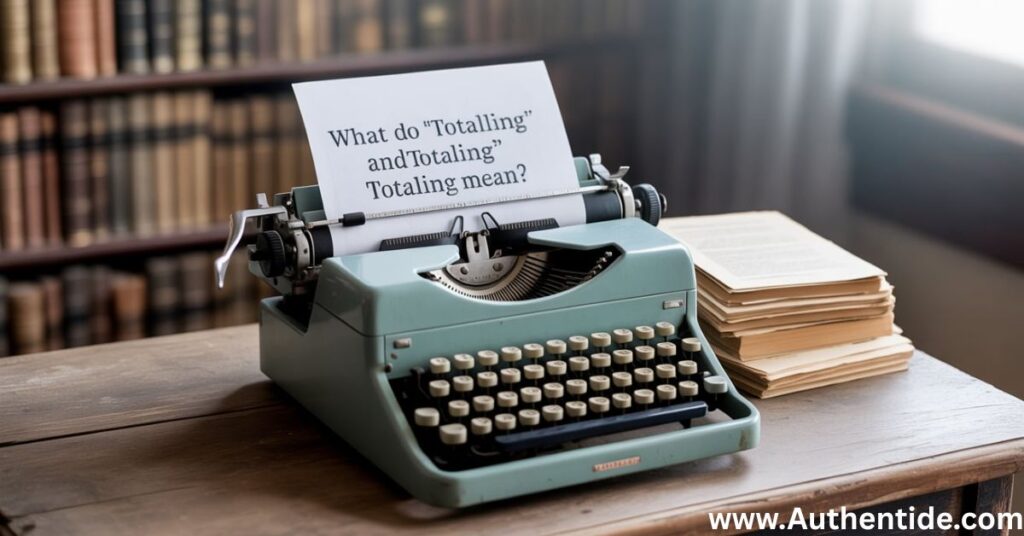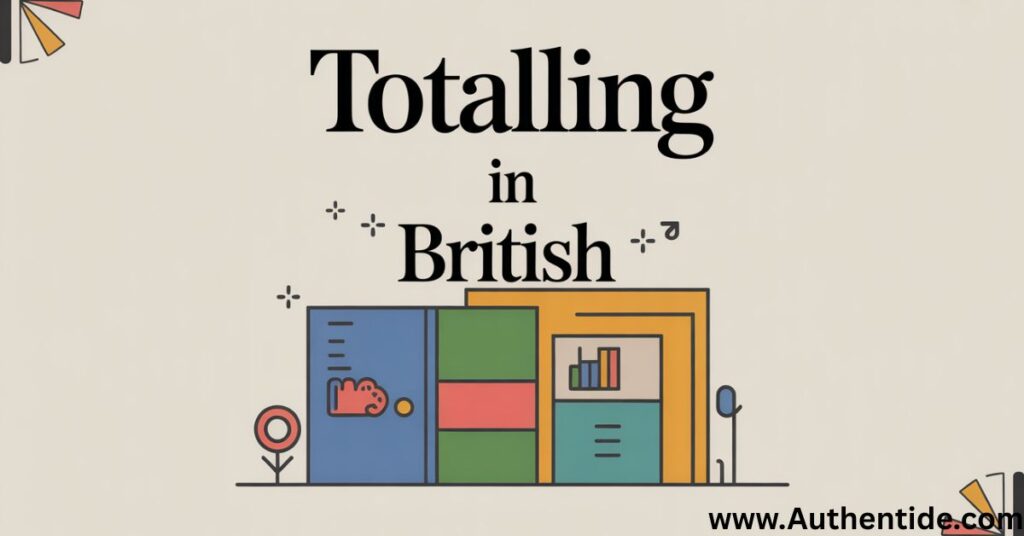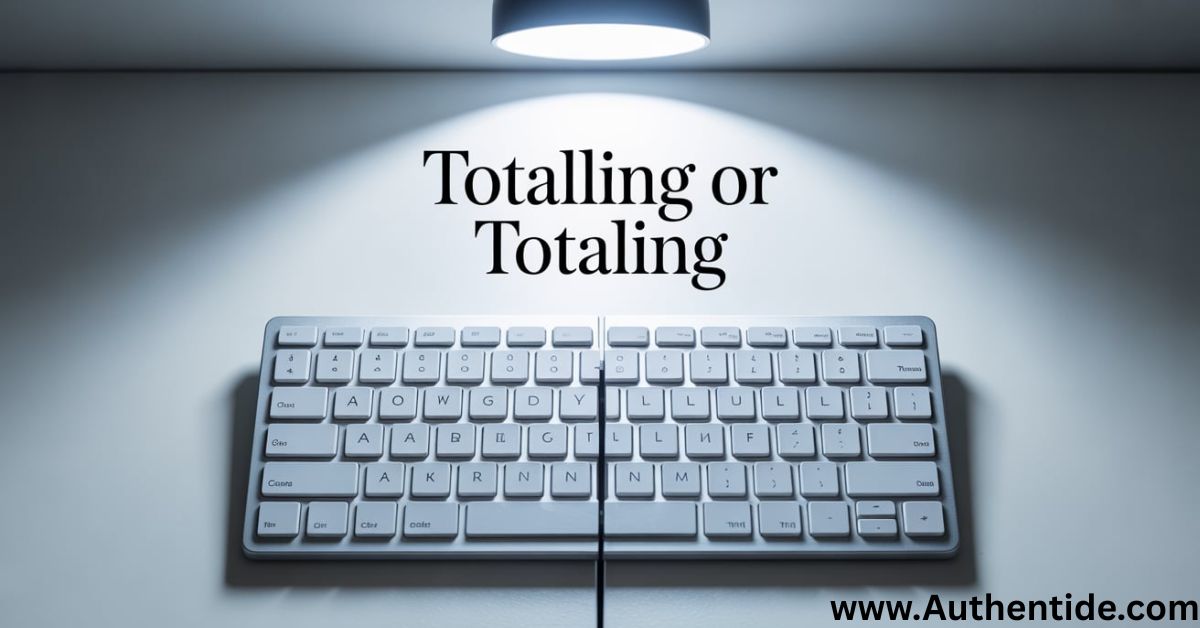Totalling or totaling—which is correct? Well, that depends on where you’re writing from. In the fascinating world of English spelling conventions, the same word can wear different costumes depending on geography. Whether you’re crafting a professional email, writing a report, or polishing a blog post, knowing the correct spelling in UK and US settings is essential. This small difference can speak volumes about your linguistic awareness and professionalism.
Language evolves with culture, and British English vs American English highlights just how deep those roots go. One tiny letter—an extra “L”—is the only thing separating “totalling” and “totaling,” yet that letter reflects a wider historical and cultural divide. If you’re from London, you’ll likely write “totalling.” But if you’re emailing from Los Angeles? It’s definitely “totaling.”
Still, it’s not just about geography. It’s about the regional language usage that affects how we communicate in different sectors—business, academia, marketing, or casual writing. Knowing how to spell totalling correctly in context is more than just grammar—it’s strategic communication.
What to say instead of Totalling or Totaling
- Totalling (British English)
- Totaling (American English)
- Adding up
- Summing
- Calculating
- Aggregating
- Computing
- Tallying
What Do “Totalling” and “Totaling” Mean?

At their core, both totalling and totaling are the present participle forms of the verb “total,” which means to add up or calculate the complete sum of something.
- In finance: “The accountant is totalling the monthly expenses.”
- In a casual conversation: “After dinner, I was totaling how much we all spent.”
Despite the spelling difference, totalling and totaling are identical. The only distinction is the double L or single L spelling based on whether you’re following British spelling vs American spelling.
Totalling vs Totaling: What’s the Difference?
Simply put, the difference lies in English language spelling variations. Both words are correct, but their usage depends on regional standards:
- Totalling (with two L’s) is used in British English.
- Totaling (with one L) is used in American English.
This is part of a broader pattern in English where British spelling retains double consonants before suffixes like “-ing” or “-ed,” while American spelling tends to simplify them. It’s the same logic behind “travelling” (UK) and “traveling” (US).
Why is there confusion between Totalling and totaling?
The confusion is entirely understandable. With the internet and global communication, you’ll find a mix of spellings in blogs, articles, emails, and even official documents. The rise of spellcheck tools hasn’t helped much either, as many are set to default to American English.
For example, if you’re a student in Canada writing a paper in APA format, you may need to use total spelling. But if you’re drafting a UK government document? Totalling spelling is your best bet.
In marketing or branding, picking the right spelling can even affect SEO visibility and user trust. Consistency in using the appropriate spelling in formal writing reflects a polished and professional tone.
Using Totalling and Totaling in Sentences
Let’s bring the usage to life. Here are some real-world examples:
Email (British English):
Hi Sophie,
I’m currently totalling the results from our quarterly surveys. Once I’ve completed the data sheet, I’ll share the findings with the team.
Cheers,
Marcus
Email (American English):
Hi Daniel,
I’ve just finished totaling all the sales from the summer campaign. Everything looks promising—I’ll prepare a summary report by EOD.
Best,
Jenna
These scenarios make it clear: choose the spelling that fits your regional audience.
Synonyms of Totalling or Totaling
When you want to switch up your vocabulary or avoid repetition, these synonyms might help:
- Adding up
- Summing
- Calculating
- Aggregating
- Computing
- Tallying
For example:
- “I’m adding up the receipts.”
- “She’s tallying the feedback forms now.”
Switching out totalling or totaling with these terms can enhance clarity, especially when writing to diverse audiences.
Totalling in British English

Let’s take a closer look at totalling in British English:
- “The shop assistant was totalling the items when the register jammed.”
- “We’re totalling the votes now, and the results will be out shortly.”
This form is prevalent in the UK, Ireland, Australia, New Zealand, and other Commonwealth countries. It’s also widely accepted in academic publications using UK grammar and spelling rules.
Totaling in American English
In the U.S., the total spelling is the norm:
- “He was totaling his receipts for the tax return.”
- “After the final race, officials began totaling the competitors’ scores.”
You’ll find this spelling in U.S.-based newspapers, educational material, and almost all professional documents in corporate America.
Common Spelling Confusion
“Totalling” and “Totaling” are far from the only victims of English spelling differences. Here are a few more that follow a similar pattern:
| British English | American English |
|---|---|
| Travelling | Traveling |
| Cancelled | Canceled |
| Labelled | Labeled |
| Fuelled | Fueled |
These words, spelled differently in British and American English, often follow the same consonant-doubling rules.
Mastering the Most Important Paragraph
One of the most crucial sections of this article is the paragraph titled “Totalling vs Totaling: What’s the Difference?” Here’s how to master its core insights:
When unsure of which spelling to use, ask: Who is my audience? If you’re writing for a UK audience, go with totalling. If it’s for a US reader, use totaling.
Set your document language in Microsoft Word or Google Docs to either British or American English to automatically catch inconsistencies.
Keep a running style guide for your team or personal use that outlines these distinctions. It saves time and boosts credibility.
A Final Look at Totalling or Totaling
To wrap it all up: totalling vs totaling isn’t a battle of right vs wrong—it’s a matter of location and context. Both forms are valid in their respective regions, and both carry the exact totalling meaning or totaling meaning.
The key is to stay aware of your audience. Are you communicating with clients in New York or colleagues in Manchester? Choosing the correct version of this common spelling confusion word shows not only language skill but cultural savvy.
So next time you find yourself second-guessing the spelling of totalling, just remember: one extra “L” might seem small, but it makes a world of difference.

Your go-to place for smart synonyms and celebrity updates. Muhammad Hassan Abid is dedicated to creating useful, engaging content that informs, inspires, and truly serves your curiosity

